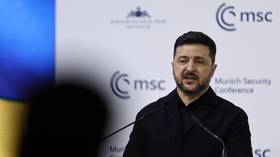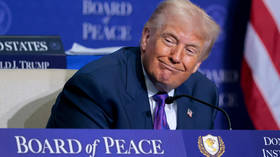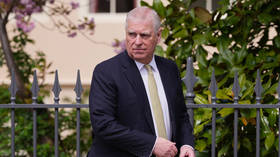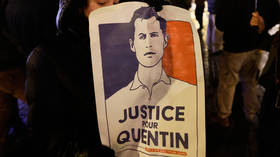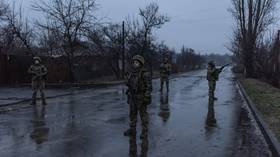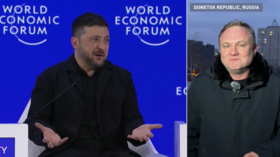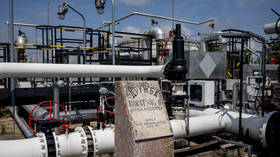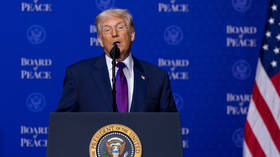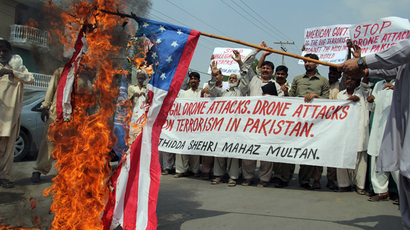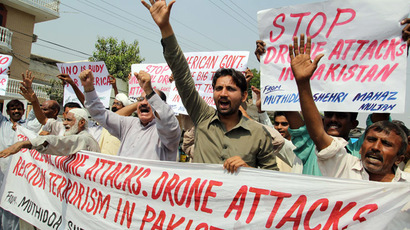RT special report: US drone strike rips Yemeni community apart
The price of America’s drone war is normally borne in silence by nameless victims in distant lands left to pick up the pieces. RT’s Lucy Kafanov visited Yemen to put a human face to a community forever changed by yet another anonymous strike from above.
“One drone changed this sleepy farming village forever. Less than an hour from Yemen’s capital, Khawlan is far removed from Al-Qaeda’s operations. But without warning it was thrust into the war on terror," RT's Lucy Kafanov, who visited the community ravaged by a drone attack, reports.
In the remote Yemeni village of Khawlan, the death of Ali Nasser al-Qawli, a math teacher and father of three, thrust a small farming community into the heart of the global war on terror.
On January 23, Ali Nasser was riding alongside his 20-year-old cousin Salim, who drove a borrowed Toyoto as a taxi. Salim made the fatal mistake of picking up two strangers who turned out to be suspected al-Qaeda militants. The story of what happened next is all too familiar in Yemen, the second most deadly hotspot in the clandestine US drone program, after Pakistan.
Witnesses first reported an ominous whirring sound in the sky and then suddenly, like a bolt out of the blue, a hellfire missile whizzed through the air, turning the vehicle and everyone inside into a charred wreck.

“The smell of death was everywhere,” Ali Nasser’s brother
Muhammad al-Qawli said. “Some bodies were burned beyond
recognition. The rest were ripped to shreds and scattered all
around. I found a part of Salim inside the car, the rest was
outside. We only recognized him by a piece of his pants. You
couldn’t tell who was who – if they were even human. It was
sickening.”
Ten months later, from the school where he taught math to the home where his family depended on him, his absence is as conspicuous as it is painful.
In the case of Salim, the loss is equally acute. His mother, Um Salim al-Qawli, showed Kafanov where her son used to sleep. Though she knows it would be better to clear away his things, she cannot bear the thought – despite the fact that he will never come home.
"God help us. I didn’t understand until the next day that an American drone killed my son,” she told RT. “Why? Tell me. May Allah deprive them of their souls like they robbed us of our son. He was the only one providing for this family. Now all we have left now is our tears.”

“The US War on Terror has no borders, often waged remotely with cruise missiles and drones. It's an undeclared global battlefield in which Yemen is just one of the frontlines, a fight against groups like Al-Qaeda, in which civilians also end up paying a price.” Kafanov said.
US President Barack Obama has publicly vowed that the “highest standard” is employed to ensure that no civilians are targeted in drone strikes. Obama, who also once reportedly proclaimed he was really good at killing people, also joked during the 2010 White House Correspondents Diner he would take out the Jonas Brothers with a predator drone strike if they “got any ideas” about his young daughters.
Last month, a 97-page report by Human Rights Watch concluded that US drone strikes against Al-Qaeda in the Arabian Peninsula (AQAP), Yemen’s branch of the global terror network, had an extremely high civilian kill rate. Out of 82 people killed in 6 HRW case study attacks, 57 were civilians. Several days earlier, a UN investigator accused the US of drastically downplaying the number of civilians killed in anti-terrorist drone operations. On the same day the Human Rights Watch report was published, Amnesty International said US officials responsible for carrying out drone strikes may be responsible for war crimes.

The Obama administration maintains that unmanned drones are a
better way to neutralize terror threats than sending in troops,
arguing it is “the course of action least likely to result in
the loss of innocent life."
"Let us remember that the terrorists we are after target civilians, and the death toll from their acts of terrorism against Muslims dwarfs any estimate of civilian casualties from drone strikes," Obama said in a speech earlier this year.
The terrorist threat in Yemen cannot be understated. In September, for example, at least 56 members of the country's security forces were kill in three simultaneous attacks carried out by Al-Qaeda. On Sept. 30, dozens of gunmen stormed and captured the headquarters of the Yemeni army's second division in the eastern city of al-Mukalla, taking military personnel hostage. Military officials said four Yemeni soldiers were killed and nine injured in the ensuing effort to retake the facility, which Al-Qaeda accused of being a US drone base.
In May 2012, a suicide bomber killed more than 100 Yemeni soldiers rehearsing for a military parade.Yemeni jihadists have also been accused of a failed 2009 assassination attempt on a Saudi prince and the British ambassador in the capital Sanaa.
As a terrorist threat, Al-Qaeda in Yemen is equally potent
abroad. The American Enterprise Institute’s Critical Threats
Project said “The most direct threat to the US homeland today
emanates from AQAP, which has attempted to attack the United
States homeland at least three times since its establishment in
January 2009.”
AQAP has been implicated in Umar Farouk Abdulmutallab's failed 2009 Christmas Day “underwear” bombing on Northwest Airlines Flight 253, Faisal Shahzad's attempted 2010 Times Square bombing, and a failed plot to down cargo flights bound for Chicago.
Critics maintain that the drone strikes program has done nothing to stem the growth of Al-Qaeda, and has even increased support for the terror network.
Despite more than a decade of US counter-terrorism efforts and drone strikes to combat jihadists in Yemen, the number of Al-Qaeda militants in the country has reportedly grown dramatically in recent years. From a few hundred militants in 2010, there were more than 1,000 in 2012, CIA director and US former anti-terror chief John Brennan said.
Writing for The Nation in 2012, Jeremy Scahill reported that US
counter-terror operations, and primarily the drone war, have in
fact ignited an Islamist uprising in the country.
For Ali Nasser’s family, who had never known the threat of an Al-Qaeda attack, the war on terror found them. Now, the prospect of justice seems as distant as the US drone pilots who changed their community forever.



